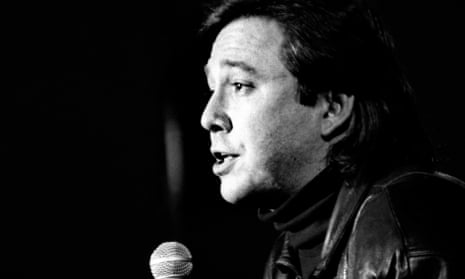Comedy Central, Channel 4, Rolling Stone: whenever there’s a poll of the greatest comedians of all time, you’ll find Bill Hicks haunting the top 10. The stature of the Texan, who died of pancreatic cancer in 1994, has grown and grown, with each posthumous DVD release or docu-hagiography stoking the legend of the fearless prophet-comic bellowing truth to power. This, we were told, was standup as it should be: revolutionary in intent, rock’n’roll in spirit – and not for the faint-hearted.
It helped with the too-hot-to-handle mythology that Hicks was a prophet without honour in the US, where audiences stayed away and his final guest-slot on Late Night with David Letterman was cut. And it helped – morbidly enough – that he died at just 32. All those routines deploring sell-outs and squalid compromises retained their power because this Kurt Cobain of standup never had the chance to betray his lofty principles in middle age.
Then there are the memories of those who were there at the time, particularly in Britain, which took Hicks to its heart in the early 90s. Those who caught him live will never forget the excitement he generated. It was a moment: comedy was the new rock’n’roll, remember. And Hicks – dressed in black, wearing a cowboy hat, with a cigarette permanently dangling from his lips – crystallised it, regularly selling out 2,000-seat theatres in London’s West End.

“But these days,” says the standup Chloe Petts, “if someone came on stage with that energy, you’d think, ‘Oh my God, you’re an arsehole!’ Don’t you think?” I’m talking to Petts on the 25th anniversary of Hicks’s death, curious to know what a generation of comics – all born after he died – make of his work. And it turns out the answer is: not so much.
Kemah Bob, a compatriot of Hicks, runs the Femmes of Colour (FOC It Up) Comedy Club in London. She’d never watched his work before I contacted her for this article, and found doing so a hoot. “He’s like, ‘Who smokes? All right! Now I’m talkin’ ’bout drugs. You know what I hate? The war on drugs. You know what I love? Sex. And rock’n’roll.’ It felt very reminiscent of the era.”
It’s not just the rock’n’roll stylings that seem quaint. It’s the things that got Hicks wound up: advertising, marketing, capitalism, and how they captured and sullied all things good. A generation later, advertising is the air we breathe, our selves are our product. It’s harder – for comedians and everyone else – to imagine how life could ever be otherwise. Bob seems to be understating things when she says: “Selling out has evolved in meaning.”
Bob’s biggest beef with Hicks, though, is that “he gets a bit misogynist”. Plenty of his material is sexually explicit, and some is sexually violent, like the revenge fantasy (trigger warning) about an ex-girlfriend now married to a 600lb welder who “makes love to her with a broom handle at night” before drowning her in his vomit. Says Bob: “No matter how much you say, ‘All right, let’s time travel and put myself in the headspace of a fan’, there’s still some stuff that’s like, ‘Oh, OK, this is so not 2019!’”
Here’s the problem. “These days,” says Petts, “if an angry white guy stands in front of an audience spouting his opinions like they’re 100% fact, people will be quite alarmed.” In the 90s, that was standup’s most romanticised mode. Today – in an era much more alert to privilege, gender and cultural politics – it’s not such a good look, especially after Louis CK’s behaviour. To Petts, who is the co-founder of queer comedy collective The Lol Word, Hicks is “like mansplaining from start to finish. And we’re a bit bored nowadays of that.”

That’s not just Petts’ and Bob’s take: some straight white guys think the same. Rob Oldham’s debut show Worm’s Lament was well received at the Edinburgh fringe last year. Anachronisms apart, Petts and Bob both admire Hicks’s comedy, considering him, in Bob’s words, “a nice dude”. Not so Oldham, who sees Hicks as unpleasant, hypocritical – and not as radical as he’s cracked up to be.
Again, it’s the toxic masculinity that’s off-putting. “In his ‘Goat Boy’ character,” says Oldham, “he revels in these paedophilic sketches. When he wants to disparage Rick Astley, it’s about having no dick as opposed to Jimi Hendrix’s big dick. Then there’s his repeated references to rape as a moral punishment. For a supposed critical voice, who doesn’t follow all the other sheep, how on Earth did he not realise he was recycling a violent patriarchal trope which has been the bedrock of an oppressive system for thousands of years?”
There’s more. “He kicks down an awful lot. The fall people are always women, gay people, Iraqis. His routines deliver devastating one-liners to members of the hospitality industry.” Take the famous “What are you reading for?” routine, in which Hicks recalls being asked this question by a waffle waitress, who becomes the butt of the joke. The problem, says Oldham, is that Hicks is quick to criticise Americans, society, the government, but seldom himself. “Something that’s truly radical needs to take a look at itself.”
For all its blind spots, however, Hicks seems to me more self-conscious, and more concerned with social justice, than Oldham gives him credit for. But Oldham’s critique does point to something about our times – which is that identity is all and the only experience anyone pronounces upon with authority is their own. The heightened self-awareness of a comic like, say, Stewart Lee is much more fashionable than Hicks’s presumption in dissecting and diagnosing the whole world.
So have we lost faith in comedians as preachers, prophets or harbingers of The Truth? “Hicks’s whole shtick is, ‘Don’t believe what the government tell you, man’,” says Oldham. “Yet his audience are engaging with him as a single voice that can tie all the questions up for them. Nowadays, we’re more sceptical of people presenting themselves as prophets. We’ve seen that that can end badly.”
It’s not just the presumption of such authority that makes us anxious. It’s the expression of contentious opinion. That used to be what many people looked for in comedy. But nowadays, under the ever-present threat of a social media pile-on, everyone’s careful about what they say.

Similarly, in the 80s and 90s, Hicks might have been the only dissident voice his audiences encountered. But in 2019, says Ed Night, “comedy is more decentralised”. Night is not only a smart, 23-year-old purveyor of social-commentary standup, he is also the son of comedian Kevin Day, who once performed with Hicks. “We have ready access to a broader range of political voices,” continues Night. “And there’s no one way to do comedy any more. Most people I know get their funny fix from Instagram.
“The idea that we might be prophets and philosophers is ridiculed now. The prevailing idea is we’re nothing but clowns. Audiences still look to comedy to address serious stuff, but on a routine by routine basis.” He cites a recent viral clip of Daily Show host Trevor Noah addressing the Liam Neeson row. “Not a comic by comic basis. No one puts comedians on a pedestal.”
All the acts I talk to wonder what Hicks would be doing now had he lived. “Would he be able to respond to the current cultural climate,” asks Chloe Petts, “bearing in mind that you can’t say ‘anything that you want’ now?” She is careful to clarify those words in quotation marks, mentioning a prevailing belief among young standups: “We don’t need to say ‘anything we want’. You can dismantle things without being offensive.”
It is possible to combine brutal imagery and social rage with the sensitivity required of modern comics. Look at Frankie Boyle’s terrific current work. But that’s not such a popular mode among young standups. A few years ago, I’d have pegged the likes of Liam Williams (who directed Oldham in Worm’s Lament) or US prodigy Bo Burnham, as Hicks’s inheritors and budding standup prophets. But neither seem to want anything to do with that mantle. Both were tormented by self-consciousness, doubted the possibility of change, and were at least as tough on themselves and their artform as on wider society.
I still loved both those acts – and I still love modern live comedy, its diversity, creativity and compassion. Yet, as someone closer in age to Hicks, I can’t help but look at today’s widespread reluctance to offend, or to propose oneself as an authority, and feel it leaves the powers that be largely unmolested.
American: The Bill Hicks Story, the documentary from 2009, ends with the words of comic Dwight Slade. “It’s not enough just to make jokes about it,” he says. “You have to kick over some tables.” Twenty-five years after Hicks’s death, plenty of comedians want to rearrange the furniture, but it will just have to happen a lot less violently.
“If these days we’re more sensitive to how other people feel,” says Oldham, “that just makes life more bearable, doesn’t it? If people are thinking about not saying horrible things – well, that would be nice, wouldn’t it?” He pauses. “On the other hand, if Hicks is looking down – or up – right now, he’d be laughing at how careful I’ve been to not say anything that’ll piss anyone off, rather than just saying what I think. So maybe I’ve got something to learn from him.”
